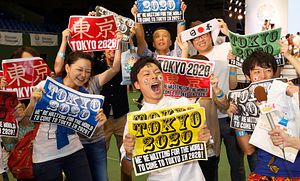French judicial authorities are investigating Japan Olympic Committee (JOC) Chairman Tsunekazu Takeda under suspicion of bribery over the bidding for the Tokyo 2020 Olympics.
French prosecutors say they uncovered evidence in 2016 connecting the Tokyo bidding team to a $2 million payment – a suspected bribe — to a now defunct Singapore-based consulting company, Black Tidings, in September 2013. Some of the funds are said to have gone into the hands of the International Athletics Federation former president Papa Massa Diack, a Senegalese national who also faces a corruption indictment for accepting millions of euros either for sponsorship contracts or to favor Japan’s bid over rivals Madrid and Istanbul.
Takeda, 71, was indicted on “active corruption” charges on December 10 by the national financial prosecutor’s office in Paris, which considers him a “formal suspect.” But a “full indictment” comes only once there is enough evidence to take to trial. Under a preliminary charge the speed of the investigation process is unknown and it could be dropped if the anti-corruption judge sees fit.
The story was first reported by French news outlet Le Monde, which reported that the IOC vote for the 2020 Olympics was rigged by bribes to African IOC members to secure votes to back Tokyo.
Takeda voluntary submitted to questioning by Japanese authorities in 2017 at the request of French police but no action was taken as a JOC panel deemed the contract to be a legitimate transaction. The longtime JOC president, Takeda, a retired equestrian Olympian, denied the accusations and pledged to cooperate with French officials “to clear up any doubts.”
In an address to the national Diet in May 2016 Takeda said he was not able to disclose the nature of contract made with Black Tidings without their approval due to a confidentiality agreement. He apologized to for the bad publicity and for causing huge worries to the people of Japan, who have given their support.
Diack, who is on Interpol’s wanted list and is resisting extradition to France, denied the accusations, saying he and Takeda only met twice. Diack called the investigation “a complete failure,” saying “Takeda is irrelevant.”
In a packed press conference in Tokyo on Tuesday, Takeda sought to dispel the claims of wrongdoing by stressing the decision to do business with Black Tidings came after positive backing from advertising giant Dentsu. Takeda deflected blame, saying he was not personally involved in the decision to sign a contract with Black Tidings and “legitimate” internal processes were followed throughout.
Takeda also doubles as IOC marketing chairman and will be investigated by an internal ethics probe where he could face temporary suspension. But the IOC issued a statement saying they would continue to monitor the case proceedings and reaffirmed that Takeda “continues to enjoy the full presumption of innocence.”
Takeda’s influential presence within the IOC and JOC saw the retirement age limit of 70 for executives bent to enable him to continue working until the 2020 Olympics, which will amount to his 11th two-year term.
Takeda’s high-ranking career and social status in Japan has been greatly influenced by his connection to the Japanese royal family. He is the son of Prince Tsuneyoshi, which makes him the great-grandson of Emperor Meiji, who ruled Japan from 1867 to 1912 and is viewed with national pride and admiration by the Japanese.

































